- Home
- Donis Casey
Forty Dead Men Page 3
Forty Dead Men Read online
Page 3
He made his way to the barn and saddled his mare. After spending yesterday evening with his family, he had had all the domestic comfort he could tolerate for the moment. Penny was not happy to leave the relative warmth of the barn, but after a snort and a head-toss, she did her duty and carried him across the fields and up to his hill.
He dismounted and rolled out his blanket, allowing Penny to graze on her own. The cold wind was gusty. Gee Dub had always been prone to earaches, and cold wind was the worst. The temperature alone had already affected his hearing. He knew from experience that an hour in frigid wind meant he would be spending the next week with an agonizing earache. He had a sudden flashback to his mother dropping warm oil into his sore ear, then pressing a heated towel-wrapped saucer to the side of his head.
The memory of his mother comforting him, of taking care of him, of trying to relieve his pain, horrified him, stabbed him like a knife. He wrapped his knitted scarf around his ears, leaving only his eyes uncovered. He was going to have to take care not to get sick while he was here. At least not sick enough for his mother to notice.
It dawned on him that he had been away for awhile, lost in his own thoughts. Something had changed about the scene. He was looking at a person, striding purposefully up the road with a carpetbag in hand. A woman. He was surprised to see her, or to see anyone at all. The road was not really a road at all. It was more of a path, two ruts in the landscape, flattened by repeated passes of Shaw’s hay wagon.
The woman appeared to know where she was going. At least she gave that impression until she reached the middle of the field. Gee Dub watched as her step faltered. She hesitated, set her bag down on the grass and sat herself on top of it, her back to the wind. She seemed small. Or perhaps it was the distance. She clasped her arms around herself and hunched over, trying to protect herself from the rain. Her posture made her look miserable, and lost.
Gee Dub stood up and walked back toward Penny, who had sensibly withdrawn into the woods a few yards behind him. He seized her reins and lifted himself into the saddle. It took a while for him to reach the lost woman on the other side of the creek. He had to backtrack through the woods to the farm road about a half-mile west. He rode to the footbridge that crossed Cloud Creek, then down to the wagon track where the woman was sitting in the field. He had expected that she would be long gone by the time he made his way around the creek, but when he reached the wagon track he could still see her forlorn figure, sitting on her carpet bag in the middle of a rut.
When he turned the horse down the track, the woman raised her head and watched him come toward her. She did not stand until he reined in. The two of them took one another’s measure for a few seconds, as well as they could do, considering that both of them were wrapped to the gills, hatted, scarfed, coated to a fare-thee-well.
She was a small woman, Gee Dub had been right about that. Her age was a mystery, her face covered as it was, but Gee Dub deduced from the high arch of her brows and the width of her striking amber eyes that she was young enough.
“You lost?” he said.
She didn’t reply. She took a step backwards and stumbled over her bag. He couldn’t judge her expression, but her posture was stiff. A tall, unknown man on horseback looming over her out in the middle of nowhere had to be frightening.
His voice softened. “Don’t worry, Miss. I don’t mean you no harm. The name is George W. Tucker. This is my family’s farm that you’re walking across. I saw you from atop that hill yonder, on the other side of the creek. You seem to be taking a cold and unpleasant hike to nowhere. Can I provide you with some direction?”
The woman seemed marginally relieved at his civilized manner. “I’m sorry if I’m trespassing. I was walking on the main road, but a passerby told me that this track was a shorter route to Boynton.” Her low-pitched, throaty voice was muffled by the woolen neck scarf that she had wrapped around her nose and mouth, but he could hear her timbre well enough to confirm that she was indeed young. She had an accent that he couldn’t identify.
“Well, Miss, if you’re coming from Muskogee, this track does cut a mile or so off the trip. But you’ve about two miles to town yet, and this is mighty foul weather for a stroll.”
“I don’t have money for a conveyance,” she said, too quickly. “I don’t have anything of value. If you’ll just point me in the right direction, I’ll be on my way.”
Her fear clutched at his heart. He had been about to offer her a ride. Gee Dub considered dismounting to be more on her level, but decided that she would be less alarmed if he didn’t make any untoward moves. He sidled Penny away from her a few steps, giving her some space. “You’re heading in the right direction. Just keep to this track for another quarter-mile. You’ll come to a barbed-wire fence, but there’s a stile to the side of the path. Once you’re over it, you’ll be on a better road. Head south…that way…another couple miles. Stick to the road and you can’t get lost.”
The woman picked up her bag and held it in front of herself like a shield. “Thank you.”
“You sure I can’t…?”
“I’m fine, Mister. You just go on your way and I’ll go on mine.”
He hesitated, half-expecting her to run away, but she stood her ground, waiting for him to leave before she felt safe enough to turn her back on him.
“All right, then.” He touched his fingers to his hat brim in a salute. “I’ll leave you to it. Best of luck to you, Miss.”
He turned Penny’s head and took out across the field at a canter. He purposely rode off in the opposite direction from the one he had told her to follow. He did not look around until he had reached the woods, but when he did he could see that she had not moved. She was watching him, wary, making sure that he was really leaving.
He guided his horse to a place where he could ford the stream, and headed directly back to the house. He threw Penny’s reins over the post beside the back porch and went inside. Alafair was standing at the oak table in the middle of the kitchen, peeling potatoes. The big cast-iron cookstove was going full blast, warming the kitchen enough that Gee Dub’s shoulders relaxed.
Alafair looked up from her paring and cocked an eyebrow. “What’s up, son?”
***
Once the tall stranger on the tall horse was well gone, the lost woman picked up her bag and walked briskly on in the rain. The fence appeared just where the cowboy had said it would. The woman crossed the stile, and half an hour later, she was trudging down the road when a buggy with the hood up against the rain came up behind her. She moved off to the side of the road, but the buggy came to a halt and a dark-eyed woman in a floppy-brimmed hat stuck her head around the hood.
“You shouldn’t be walking in this rain, honey. You’ll catch your death. Where you headed?”
The traveler raised a hand to keep the rain out of her eyes and gave her would-be rescuer the once-over. She was middle-aged and middle-sized at best, wrapped in a heavy cloth coat, sitting next to a young girl with curious black eyes and thick black braids.
“I’m trying to get to the next town. Are you going that way, ma’am?”
“You’re going to Boynton? Climb on in.” She handed the lost woman up and settled her next to the little girl. “I declare, you’re about drowned! I’m Miz Tucker. This here is Grace.”
“Howdy,” Grace chirped.
The lost woman sank back in the upholstered seat, relieved to be out of the rain. “My name is Holly Johnson.”
Alafair snapped the reins and the horse began to move. “Holly! What a pretty name. I never met a Holly. You look like you’ve been on the road a while, Holly. Are you looking to meet up with somebody in Boynton?”
“No, it’s just the next town on the road to Okmulgee. But I want to get out of the weather and maybe have a rest. I’ve been walking all day and I’m bone-tired.”
“When was the last time you ate?”
Holly didn’
t answer, but the question elicited an ironic laugh.
There was a moment of concerned silence before Alafair said, “Why don’t you come back to the house with us and have a bite of dinner, Miz Johnson? Dry off and rest your feet for a spell. Once you’re feeling better, I’ll carry you on in to Boynton and drop you off wherever you want.”
Holly’s first inclination was to refuse, but it had been such a long journey, and so hard. She had felt like a fawn among jackals for so long that it was hard for her to trust anyone. The idea of warmth and food and kindness was so overwhelming that she had to brace herself sternly to keep from bursting into tears.
Alafair sensed her mood. “The house is just over yonder, less than a mile, honey. You’ve come this far, you might as well finish the journey a couple of hours later, rested and with a full belly.”
***
Now that the hood of the buggy offered her some protection from the rain, Holly was able to take in the scenery. Since she had left Muskogee, the best she had been able to do was keep her eyes on her feet, to keep the rain out of her face and her shoes out of puddles. It was a misty, gray day, but the landscape was rather pleasant. The country was wide open, punctuated by rolling hills and large stands of native trees between cultivated fields that lay fallow this time of year. On the trip between Chicago and St. Louis, she had spent hours watching out the window as the train passed mile after mile of half-grown fields of winter wheat. After she reached Springfield, Missouri, the country had become one forested mountain after another. There was not much wheat here in eastern Oklahoma. She idly wondered what the farmers raised in these now-sodden black fields.
Mrs. Tucker steered the buggy off the main road and onto a well-graded section-line road that passed by a couple of neat farmhouses, a small herd of white-faced cattle, all facing in the same direction, rear ends to the rain, and endless stretches of barbed-wire fence.
The gray mare pulling the buggy lifted her head and picked up the pace of her own volition, so Holly expected that they were nearing Mrs. Tucker’s house. She was proved right when they pulled up in front of a wide wooden gate and the little girl jumped down without a word to swing it open and allow the buggy to drive through. Mrs. Tucker pulled up long enough to let Grace close the gate behind them and climb back up beside Holly. Grace gave Holly a grin of accomplishment. Her two top baby teeth had made their exit and one white incisor was just beginning to erupt. Holly grinned back, charmed in spite of herself.
She could see the house in the distance. It was a typical country farmhouse, a white clapboard square with a long covered porch running across the front. A white picket fence surrounded the yard, and an old-fashioned stone well with a wooden cap over the opening stood in one corner. An enormous garden took up one entire side of the yard and spilled over onto the adjacent plot of land. To Holly’s surprise, close to the house a few vegetables had already poked up through the soil. She could identify a couple of varieties of lettuce, some onion tops, and radish leaves. Where she came from, it was far too early to think about starting a truck garden.
Alafair drove to the back of the house and halted in front of a ringed hitching post beside the back door. They entered the house through the screened-in back porch, which was alive with potted plants and fragrant with drying herbs hanging from the rafters. A clothesline, draped with drying shirts, had been strung across one corner of the porch.
Grace ran ahead and Alafair steered Holly into the kitchen after her. Holly took a long minute to get herself oriented. The kitchen was dominated by a cast-iron cookstove almost as big as the buggy they had driven in on. Two girls on the verge of adolescence—one tall dark-haired beauty with striking green eyes and one small wraith with frizzy reddish hair and a wealth of freckles—were standing in the middle of the floor eyeing her with unabashed curiosity.
Alafair waved toward them. “Miz Johnson, these are some more of my girls. That one is Blanche and that’s Sophronia.”
“Call me Fronie, Miz Johnson,” the freckle-face said. “Everybody else does.”
Alafair took charge. “Fronie, run out and take care of Missy and the buggy for me. Miz Johnson, take off them wet things and hang them over there on that hat tree beside the stove. They’ll be dry by the time dinner’s over. Have a seat yonder. Grace, get our guest a plate and utensils. Miz Johnson, honey, would you like coffee or tea? Now, you need to drink something hot with lots of sugar, warm up your innards. Blanche, pour our guest a mug of coffee.”
Holly sat numbly at the end of the table while the girls fussed around her. A dog, an aged yellow shepherd, ambled into the kitchen, plopped down beside her chair, and leaned his substantial bulk against her leg.
“That’s Charlie Dog,” Grace said. “He likes you.”
The old dog shifted to lie across Holly’s feet under the table. His warmth was comforting. Holly smiled. “I like him, too.”
Alafair went out the back door, and Holly heard her calling, a meaningless high-register holler that surely carried for miles—Oooo-eee.
Holly did not understand what Alafair was doing. She didn’t understand much these days. This country, this life, was far removed from her experience. But she was at the end of her endurance, and had no strength left to make sense of anything.
Alafair came back inside as though nothing unusual had just occurred, and took up a post at the stove to ladle soupy green beans and fatback out of a pot and into a serving dish. The girls piled dish after dish of vegetables onto the table, as well as an enormous platter of fried pork. When Holly was convinced that there was no room left on the table for one more saucer, she heard the sound of boots on the porch and men’s voices. The girls flitted around the table and settled into their seats like a flock of birds settling on a wire.
The back door opened and two men entered. Obviously father and son. Both black-haired, with high cheekbones and almond eyes, and the sun-browned skin that came with a life lived outdoors. The father sported an impressive floppy black mustache that twitched when he looked at the strange woman at his table. His eyes were green-brown, the dappled hazel color of the forest, warm and welcoming. He did not seem surprised to see her. “Howdy, young lady,” he said, “glad to see you.” He had seated himself at the other end of the table before Holly’s attention turned to the son, who was still standing beside the back door with his hands clasped behind his back. His close-cropped black hair tended to curl on the top. But what gave Holly a start was her recognition of eyes so dark that she couldn’t tell where the iris ended and the pupil began.
“It’s you,” she said.
He smiled. “I figured you’d be more comfortable accepting help from my ma than from some raggedy bum on a horse.” He stepped forward and offered her a hand. She took it. “Call me Gee Dub.”
Now that she had shed her coat and hat and scarves, Gee Dub was finally able to get a good look at the wary stranger he had found in the field. The voluminous outerwear had made the woman seem bigger than she was. She wasn’t very substantial at all—small, thin, and hollow-cheeked. Her hair was the color of buckwheat honey, dark and thick and rich, with just a touch of amber to complement the color of her eyes. She had scraped it into a severe bun at the back of her head, practical for traveling.
Holly flinched when Alafair put a hand on her shoulder. She hadn’t been aware that anyone was standing behind her. “It’s a good thing he come got me, sugar, or you’d have froze clean to death out there in that field and nobody would have found your bones until spring. Now, don’t you worry about anything but getting some good hot food into yourself. I declare, you need some meat on you if you mean to go traveling by foot in this weather. When you’ve eaten your fill, I’ll get you into town. Or if you’d rather, you can have a sit by the stove for a spell, until you get warmed up.”
Chapter Five
The food was hot and delicious and plentiful, but starving as she was, Holly was almost too tired to lift her f
ork. The family that she found herself dropped among was a lively crew, laughing and chatty. They seemed to understand that their guest needed to regain her strength before telling her story, so they happily took turns telling her about themselves. The only one who had nothing to say, Holly observed, was Gee Dub. He watched her quietly out of enigmatic dark eyes while his father talked.
“We’ve been out here for dog’s years,” Shaw was saying, “raising horses. I lost most of my work crew to Uncle Sam when the war came, but they’re trickling back now, one by one.” He cast a glance at Gee Dub, who did not glance back. “Our other boy, Charlie, is still in service, but now he’s back in the States from Europe. He wrote us that when he does get out of the Army, he’s going to travel around for a spell, see some of this country before he comes home. Gee Dub here has just been home for a few days. Still getting used to civilian life, aren’t you, son?”
“That about sums it up,” Gee Dub said.
Alafair leaned forward and placed her elbows on the table. “Now, you haven’t said ten words together, Miz Johnson, but I can tell by the way you said them that you didn’t grow up around here. Where you from?”
“New England. Maine. Portland, Maine.”
Alafair and Shaw exchanged a glance before she said, “You’re a long way from home. What brings you out to the wilds of Oklahoma? I expect it wasn’t a hankering to walk across the fields in the rain.”
Holly developed a sudden interest in a crockery pot sitting on the windowsill. “I’m looking for my husband. He disappeared after the war ended. When I enquired of his sergeant, he told me that Dan’s family lives in some place called Okmulgee. A few months ago I wrote to his mother, care of general delivery in Okmulgee, but I never heard back. So I thought I’d better come out here and find them. See if they know what happened to him.” Her eyes narrowed as she scrutinized the pot even more closely. “I’ve been traveling from Maine for weeks.”

 The Wrong Girl
The Wrong Girl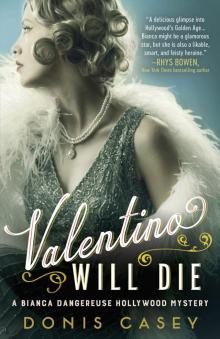 Valentino Will Die
Valentino Will Die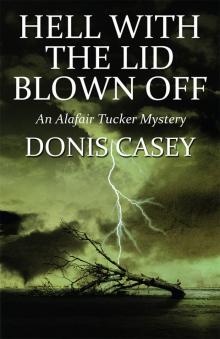 Hell With the Lid Blown Off
Hell With the Lid Blown Off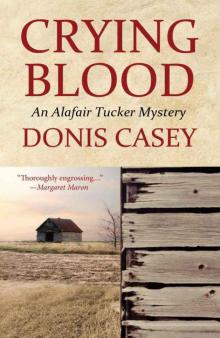 Crying Blood - An Alafair Tucker Mystery
Crying Blood - An Alafair Tucker Mystery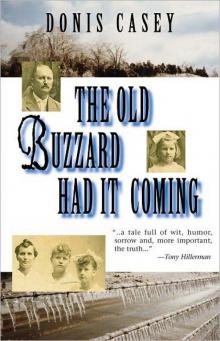 The Old Buzzard Had It Coming: An Alafair Tucker Mystery
The Old Buzzard Had It Coming: An Alafair Tucker Mystery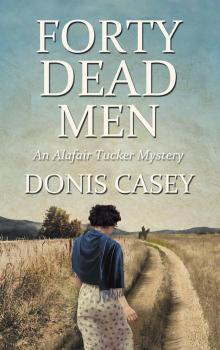 Forty Dead Men
Forty Dead Men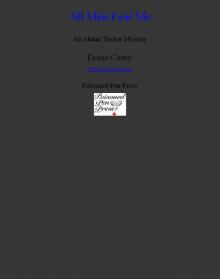 All Men Fear Me
All Men Fear Me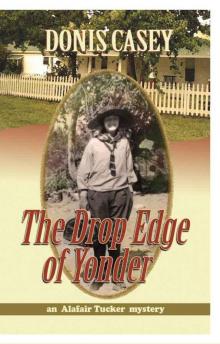 The Drop Edge of Yonder - An Alafair Tucker Mystery
The Drop Edge of Yonder - An Alafair Tucker Mystery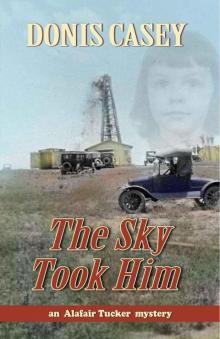 The Sky Took Him - An Alafair Tucker Mystery
The Sky Took Him - An Alafair Tucker Mystery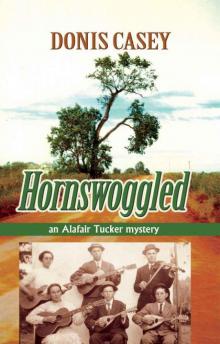 Hornswoggled - An Alafair Tucker Mystery
Hornswoggled - An Alafair Tucker Mystery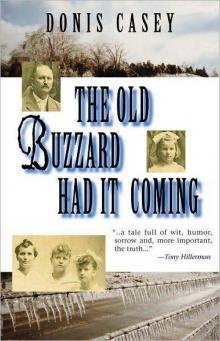 The Old Buzzard Had It Coming
The Old Buzzard Had It Coming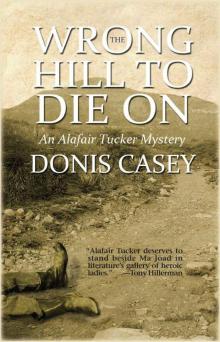 The Wrong Hill to Die On: An Alafair Tucker Mystery #6 (Alafair Tucker Mysteries)
The Wrong Hill to Die On: An Alafair Tucker Mystery #6 (Alafair Tucker Mysteries)